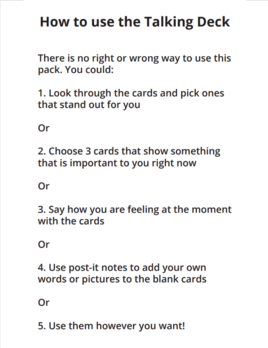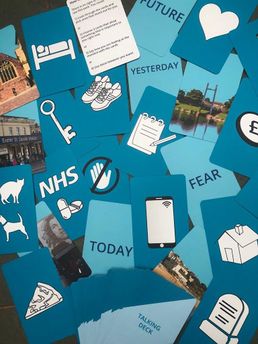Transferability
During HAIRE, partners were able to explore opportunities to promote HAIRE's tools in sites that were adjacent to their local communities. Some additional sites used HAIRE's tools as they were. However, others adapted the tools to better suit their needs. This section provides an overview of interesting toolkit adaptations and will continue to grow, as the toolkit is adopted by future users.
Colab Exeter, United Kingdom
Colab Exeter’s wellbeing hub hosts around 30 voluntary sector and statutory organisations who support people in Exeter, UK, with experiences of homelessness, addiction, the criminal justice system, the care system and domestic abuse. Over a series of workshops, staff, volunteers, researchers and people with lived experiences came together to co-design a Guided Conversation that would be suitabe for CoLab's support activities.
The final design produced a deck of cards called the Talking Deck. The artwork for the cards was produced by artist Hugh McCann. These cards helped individuals to pick what they wanted to talk about and focus on issues that were linked to what they had experienced in the past week, day or hour. This approach suited CoLab better. Individuals seeking support focused on more immediate issues, as opposed to reflecting on a specific local area's influence on their wellbeing.
More information can be found on the use of the Talking Deck here: Talking Deck
Herselt, Belgium
During the project, HAIRE's partners in Laakdal, Belgium, received interest from another local authority (Herselt OCMW) about developing a Guided Conversation. In Herselt OCMW's case, the local authority wanted to know more about the person and their home, as opposed to the local area. They felt that they had adequate knowledge about the local area's influence on its residents from a previous project.
Based on the existing knowledges and experiences in Herselt, a Guided Conversation that was similar to the one used in HAIRE was produced. However, place-based topics were excluded and the radar diagrams, used for scoring (1-7) how individuals feel about certain influences, were included as an optional feature. Many participants did not choose to use the scoring system. This worked for Herselt OCMW, as they were more interested in what people had to say about how they felt and their opinions.
Additionally, in Herselt, volunteers were given a lot of information about what supprt and activities were available in the local area before conducting Guided Conversations. The municipality had advanced knowledge in this area, due to a previous project. Therefore, during the action planning stage of the Guided Conversation, volunteers were able to suggest immediate actions for participants easily, e.g. joining clubs / activities and finding local information. Note: if this type of knowledge is not available, HAIRE's Neighbourhood Analysis can help to equip volunteers with such knowledge (see Neighbourhood Analysis section).
Finally, to help with training volunteers in Herselt, a presentation was prepared - see here: Herselt's Guided Conversation Training Information
Referenties
- Talking Deck, CoLab Exeter, CoLab Exeter, 30 maart 2023.
- Neighbourhood Analysis Guidance, HAIRE, 1 februari 2023.
- A GC for Herselt (BE), University of Exeter, Laakdal OCMW and Welzijnszorg Kempen, University of Exeter, Laakdal OCMW and Welzijnszorg Kempen, 30 maart 2023.



